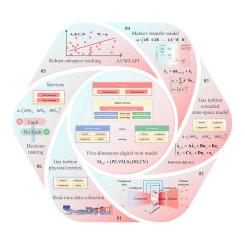Robust subspace tracking in intelligent fault diagnosis of digital twin gas turbines base on the adaptive Markov transfer
IF 11
1区 工程技术
Q1 ENERGY & FUELS
引用次数: 0
Abstract
Gas turbines play a crucial role in energy, transport, and the net-zero transition, making secure and efficient operation paramount. Despite advancements in digital twin (DT)-based intelligent fault diagnosis (FD) for gas turbines, real-time accurate condition monitoring and isolation of multiplicative faults remain persistent challenges. These challenges stem from multi-component coupling, the scarcity of labeled fault data, and the presence of data corruption. To address these issues, this study develops an unsupervised adaptive intelligent fault diagnosis strategy employing a five-dimensional DT model and integrating a discrete-time Markov chain with an extended Koopman operator, utilizing subspace tracking techniques. First, a gas turbines state-space prediction model is formulated based on the extended Koopman operator, and in conjunction with a generalized Hankel matrix, a Markov parameter vector and an extended Markov matrix are derived, ultimately yielding a continuous-time nonlinear time-varying state-space system model. Subsequently, utilizing real-time operational data from the gas turbines, the signal principal subspace is updated using Fast Approximate Power Iteration (FAPI) subspace tracking. By aligning this signal principal subspace with the Markov parameter vector and extracting the parameter matrix, online real-time monitoring of gas turbines state parameters is achieved. Furthermore, to enhance robustness against non-standard Gaussian contaminated noise environments, a dynamically adaptive robust subspace tracking method based on α-divergence is proposed. The proposed method's reliability and superiority are demonstrated through extensive experimental results, exhibiting an F1 score above 97 % in all scenarios, which outperforms existing subspace tracking methods under contaminated noise and multiplicative fault conditions.

基于自适应马尔可夫转移的数字双燃气轮机鲁棒子空间跟踪智能故障诊断
燃气轮机在能源、运输和净零转型中发挥着至关重要的作用,使安全高效的运行至关重要。尽管基于数字孪生(DT)的燃气轮机智能故障诊断(FD)技术取得了进展,但实时准确的状态监测和多重故障隔离仍然是一个持续的挑战。这些挑战源于多组件耦合、标记故障数据的稀缺性以及数据损坏的存在。为了解决这些问题,本研究开发了一种无监督自适应智能故障诊断策略,该策略采用五维DT模型,并利用子空间跟踪技术将离散时间马尔可夫链与扩展库普曼算子相结合。首先,建立了基于扩展Koopman算子的燃气轮机状态空间预测模型,并结合广义Hankel矩阵,导出了马尔可夫参数向量和扩展马尔可夫矩阵,最终得到了连续时间非线性时变状态空间系统模型。随后,利用燃气轮机的实时运行数据,使用快速近似功率迭代(FAPI)子空间跟踪更新信号主子空间。通过将该信号主子空间与马尔可夫参数向量对齐并提取参数矩阵,实现燃气轮机状态参数的在线实时监测。此外,为了增强对非标准高斯污染噪声环境的鲁棒性,提出了一种基于α-散度的动态自适应鲁棒子空间跟踪方法。大量的实验结果证明了该方法的可靠性和优越性,在所有场景下F1得分均在97%以上,优于现有的污染噪声和乘性故障条件下的子空间跟踪方法。
本文章由计算机程序翻译,如有差异,请以英文原文为准。
求助全文
约1分钟内获得全文
求助全文
来源期刊

Applied Energy
工程技术-工程:化工
CiteScore
21.20
自引率
10.70%
发文量
1830
审稿时长
41 days
期刊介绍:
Applied Energy serves as a platform for sharing innovations, research, development, and demonstrations in energy conversion, conservation, and sustainable energy systems. The journal covers topics such as optimal energy resource use, environmental pollutant mitigation, and energy process analysis. It welcomes original papers, review articles, technical notes, and letters to the editor. Authors are encouraged to submit manuscripts that bridge the gap between research, development, and implementation. The journal addresses a wide spectrum of topics, including fossil and renewable energy technologies, energy economics, and environmental impacts. Applied Energy also explores modeling and forecasting, conservation strategies, and the social and economic implications of energy policies, including climate change mitigation. It is complemented by the open-access journal Advances in Applied Energy.
 求助内容:
求助内容: 应助结果提醒方式:
应助结果提醒方式:


